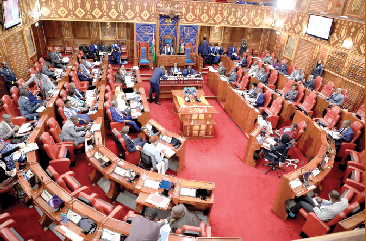Senators decry child abuse by maids

Senators have raised the alarm over what they term “escalating cases of violence, abuses, and other malpractices” meted out on children and, sometimes, their parents by domestic workers.
Taking to the floor of the Senate on Thursday, the lawmakers regretted that the lives of many minors have been endangered by rogue and violent caregivers. The senators spoke in the wake of rampant cases of abuses and violent acts by domestic workers.
They cases include Muiruri Kibe, who died from internal injuries he sustained allegedly from attacks by Maureen Nyaboke, their house-help. The house-help, whose name has not been revealed, was later arrested and investigations into the incident are ongoing.
Life in prison
In Mombasa, a 21-year-old woman who confessed to filming herself defiling a four-year-old boy, and posting it online, was sentenced to life in prison by Senior Resident Magistrate Florence Macharia.
The investigating officer unearthed how child pornography syndicates collaborate with house-helps to abuse children and film the acts.
Early last year, a house-help stabbed two minors rather than take the marching orders issued to her kindly.
She returned to her employer’s residence in her absence and assaulted the same children, ostensibly to revenge on their mother.
“These incidents should remind parents of the dangers their children, especially the young ones, are exposed to by the people they (parents) have entrusted with giving care and security to them,” nominated Senator Falhada Iman said.
She added that the rate at which minors are being subjected to maltreatment by caregivers is quite alarming.
“Many more cases remain under-reported yet they have impacted negatively on parents whose minors have fallen victims to such abuses, as well as the victims who survived sexual ordeals,” added Iman.
According to her, abuses often result in problems associated with adverse childhood experiences — with a significant increase in the risk of health problems such as heart disease, stroke, diabetes, as well as mental health problems like anxiety, depression, and post-traumatic stress.
He advised parents to obtain relevant documentation, such as a photocopy of the identification card of the house-help, for future reference.
Parents are also advised to beware of certain city employees, and to have telephone contact as well as details of the next of kin of the house-help should the need arise.
“They should also endeavour to take clear photographs of the employees and contact the former employers for relevant information on the individuals,” she advised.
According to her, the recommendations can help reduce such incidents, which are often disregarded especially in middle-class households, possibly due to the employer’s desperation to get the next house-help or due to the legal employee implications that accompany such inquiries.
On his part, Nairobi Senator Johnson Sakaja blamed the National Employment Authority for failing in its duties, adding that instead of just looking at external domestic labour migration, even locally, it was supposed to have an agency akin to the National Employment Bureau, where anyone seeking a job, or anyone who’s getting employment, should have been on the database.
Sakaja lamented that children are at risk at the places supposedly to be the safest — their homes. He advised employers to evaluate themselves, saying many of them are mistreating their house-helps.
“I’ve heard of cases where these domestic workers are not given food. Or they’re told to sleep on the balcony, or that they should not eat what the family is eating,” he said.
“If people are working in your house, and you mistreat them, you’re punishing them. Same with verbal abuse … You cannot treat somebody as a second-class person and expect them to treat your child with dignity. These are also human beings. We need to have sanity in society,” he added.
According to him, the government cannot legislate on morality: “We cannot make a law on kindness, or on common sense or decency”.
Nominated Senator Abshiro Halakhe said there is general lawlessness and lack of values owing to the general desperation the country is in. This is making people take it out on persons close to them, she said.
“I’m not excusing it, where criminal offences have been committed. And we must, of course, look at the well-being and welfare of our children, especially as more and more mothers go to work and as more women fend for their children and, therefore, have to leave the children with domestic workers,” said Halakhe.










